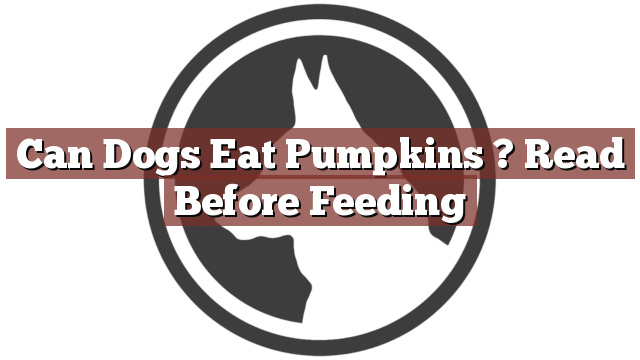Understanding Your Dog’s Dietary Needs
As a responsible dog owner, it is crucial to have a good understanding of your furry friend’s dietary needs. Providing a balanced and nutritious diet is essential for their well-being and overall health. While dogs primarily thrive on a diet consisting of high-quality dog food, it is not uncommon for pet owners to wonder about incorporating other foods into their dog’s diet. One such food that often raises questions is pumpkins.
Can Dogs Eat Pumpkins? Read Before Feeding
Can dogs eat pumpkins? This is a common question among pet owners, especially during the fall season when pumpkins are in abundance. The answer is yes, dogs can safely eat pumpkins in moderation. Pumpkins are packed with beneficial nutrients and can provide various health benefits to your furry companion.
Pumpkins are a great source of fiber, which aids in digestion and can help regulate your dog’s bowel movements. Additionally, pumpkins are low in calories and fat, making them a healthy treat option for weight-conscious dogs. The high water content in pumpkins can also help keep your dog hydrated.
Pros and Cons of Feeding Pumpkins to Dogs
Feeding pumpkins to dogs can have several advantages, but it is important to consider the potential drawbacks as well. Let’s take a look at the pros and cons of incorporating pumpkins into your dog’s diet.
Pros:
- Improved Digestion: The high fiber content in pumpkins can help regulate your dog’s digestive system and alleviate constipation or diarrhea.
- Weight Management: Pumpkins are low in calories and can be a healthy treat option for dogs that need to shed a few pounds.
- Hydration: With its high water content, pumpkins can help keep your dog hydrated, especially during hot summer months.
- Nutritional Boost: Pumpkins are a good source of vitamins A, C, and E, as well as potassium, iron, and beta-carotene, which can contribute to your dog’s overall health.
Cons:
- Allergic Reactions: While rare, some dogs may have allergies to pumpkins. Monitor your dog closely after introducing pumpkins to their diet for any signs of an allergic reaction.
- Overfeeding: Like any food, feeding too much pumpkin can lead to digestive upset, such as gas or loose stools. Always introduce new foods gradually and in moderation.
In Conclusion: Is Pumpkin Safe and Beneficial for Dogs?
In conclusion, yes, dogs can eat pumpkins and benefit from their nutritional value when given in moderation. Pumpkins can aid in digestion, weight management, and provide a nutritional boost. However, it is important to monitor your dog for any signs of allergies or overfeeding. Always consult with your veterinarian before making any significant changes to your dog’s diet. Remember, a balanced and nutritious diet, primarily consisting of high-quality dog food, should be the foundation of your dog’s diet.
Thank you for taking the time to read through our exploration of [page_title]. As every dog lover knows, our furry friends have unique dietary needs and responses, often varying from one canine to another. This is why it's paramount to approach any changes in their diet with caution and knowledge.
Before introducing any new treats or making alterations to your dog's diet based on our insights, it's crucial to consult with a veterinarian about [page_title]. Their expertise ensures that the choices you make are well-suited to your particular pet's health and well-being.
Even seemingly harmless foods can sometimes lead to allergic reactions or digestive issues, which is why monitoring your dog after introducing any new food item is essential.
The content provided here on [page_title] is crafted with care, thorough research, and a genuine love for dogs. Nevertheless, it serves as a general guideline and should not be considered a substitute for professional veterinary advice.
Always prioritize the expert insights of your veterinarian, and remember that the health and happiness of your furry companion come first.
May your journey with your pet continue to be filled with joy, love, and safe culinary adventures. Happy reading, and even happier snacking for your canine friend!

